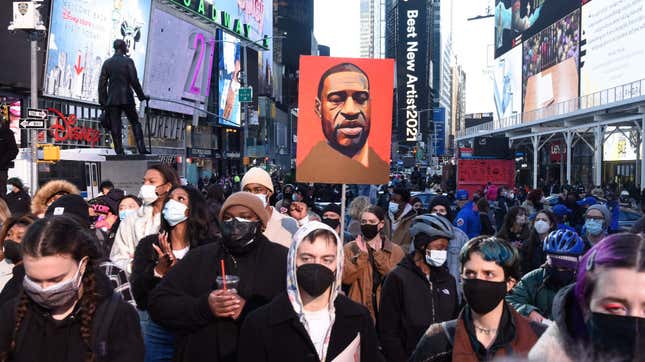
The Movement for Black Lives—a coalition of 150 organizations from across the nation that was formed in 2014 and has been instrumental in organizing anti-racism protests since the Black Lives Matter movement began—has let it be known that it opposes the George Floyd Justice in Policing Act (pdf). Of course, the coalition doesn’t disapprove of the legislation for the same reason all but one House Republican did when it passed in the House earlier this month, which is because Republicans think it’s anti-cop, anti-America and anti-white people’s fragile-ass feelings (I made up the last one, but it’s definitely true). Instead, the movement opposes it because it believes the bill does nothing but provide more of the same type of reform policies that have failed in the past. And while one could easily argue that no single bill is likely to unilaterally solve systemic racism in policing, the organization makes some damn good points.
From the Associated Press:
“Over this summer, communities lifted up solutions that would truly address the root causes of police violence and terror,” the movement wrote in a letter addressed to the chairman of the House Judiciary Committee, Rep. Jerry Nadler, D-N.Y., and to Reps. Sheila Jackson Lee, D-Texas, and Karen Bass, D-Calif., and Sen. Cory Booker, D-N.J., and shared with the AP on Wednesday. “Justice in Policing, by its very name, centers investments in policing rather than what should be front and center — upfront investments in communities and people.”
The bill, which is named for the man whose killing by police in Minnesota last Memorial Day sparked global protests against racial inequity, would ban chokeholds and “qualified immunity” for law enforcement while creating national standards for policing in a bid to bolster accountability. The bill is supported by President Joe Biden and has received support from some of the nation’s leading civil rights organizations.
The general issue here is that laws are being named for victims of police violence, but the contents of those laws make it clear that, even if they had been enacted while the victim was alive, it’s not likely they would have saved that person’s life.
For example: Besides the fact that there have been laws and policies barring police chokeholds for decades that hasn’t stopped the practice from happening. How exactly would a chokehold ban have saved Floyd when a knee pressed into his neck is not what anyone thinks of when they think of chokeholds?
Another example is Breonna’s Law, which was named for Breonna Taylor and bans no-knock warrants. While I do believe no-knock warrants should be banned across the country, I wonder how the ban would have saved Taylor considering the fact that the cops involved in her shooting claimed they did knock first? Perhaps a better “Breonna’s Law” would have been aimed at cops obtaining search warrants through faulty information and a half-assed vetting process.
All of this is addressed in the movement’s letter.
“The bill bans federal use of chokeholds, ignoring the reality that police have killed Black people in this manner regardless of whether these bans are in place,” the letter states. “A no-knock warrant ban would not have saved Breonna Taylor’s life, just like a ban on chokeholds did not save Eric Garner’s life. The JPA fails to address the root causes and realities of policing in this country.”
Anyway, the movement said it supports the ban on qualified immunity, but it said the rest of the bill is too focused on what it called “incrementalist reforms.”
And in case you’re thinking, “Well they are citing problems, but do members of the Movement for Black Lives have any solutions of their own?”—well, the answer is yes, yes they do.
More from AP:
Instead, the movement is pushing political leaders to enact the BREATHE Act, which it proposed last July and believes addresses the fundamental causes of police violence.
The AP first reported that the BREATHE Act would transform the nation’s criminal justice system through sweeping changes, such as eliminating the Drug Enforcement Administration and the use of surveillance technology, abolishing mandatory minimums and ending life sentences.
The bill, designed by the Movement for Black Lives’ Electoral Justice Project, would also redirect funding toward communities to address the nation’s systemic racial injustices.
“It’s not just about after the fact accountability,” said Gina Clayton-Johnson, the lead BREATHE Act architect and leadership team member of the Movement for Black Lives’ Policy Table. “There’s this thought that Black people are dying at the hands of police officers because individual officers are bad actors, but it is actually a systemic issue, and if you understand it to be systemic, then the solutions must also be systemic.”
And there you have it. Because what exactly is police reform if it doesn’t address systemic issues in policing? Basically, it’s just more of the same.

